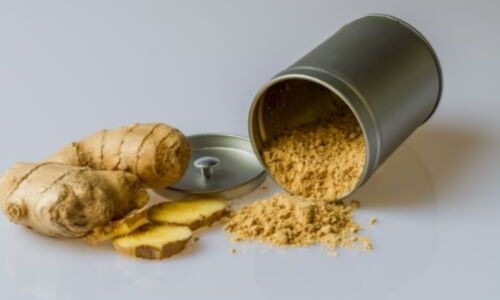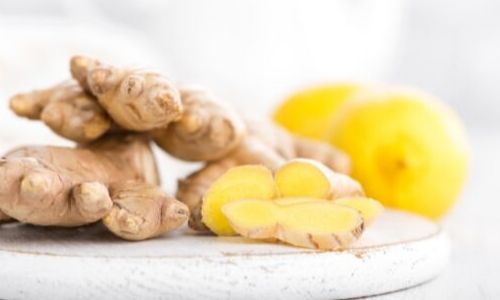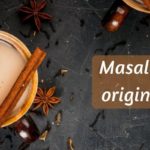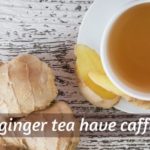Ginger is one of those plants (actually roots) that are constantly being praised for their health benefits. But what about ginger tea, how does it help ?
How did ginger tea come about, and where does it grow ?
And how do you make your own, in the comfort if your own home ?
All this and more will be covered in this beginner's guide to ginger tea. I plan on bringing you all the info I can on ginger tea, and ginger root. Let's begin.

Table of Contents
What is ginger tea ?
Ginger tea is an herbal tea, made from the grated root of the ginger plant. You can get the root either fresh, or cut up and dried for easier storage.
Ginger tea is more of a health drink than a flavorful tea, as in most of the time folk drink it for its health benefits, not for its flavor.
It's been used for centuries, especially in Eastern and Southern Asia where the root is very common. And it's also prized both for the lemony-lavender flavor it has, as well as the spiciness that comes with heated or dried ginger.
Where does ginger come from ?
Originally ginger came from Southeast Asia, meaning Indonesia, Thailand, Malaysia, Philippines, Brunei, Singapore and East Timor. This is where ginger grows naturally, though it's now grown in most of Asia.
A cousin of cardamom and turmeric, it grows easily in ares of high heat and high humidity.
It arrived in Europe via the spice trade route, and was used by Greeks and Romans in many of their dishes. Nowadays though you'll find the ginger root even in Hawaii, and can possibly find it grown in a greenhouse on any continent.
So if you were looking to know where your ginger comes from, it's most probably from East or South (or Southeast) Asia, as that's where it grows best.
What does ginger tea taste like ?
Ginger tea, made from the root of the ginger plant, tastes a bit different than the root smells. It's got a lemony flavor to it, and for me it's always like that perfect, once in a lifetime kind of lemon tart smell.
Tasting it though is a little underwhelming, since the scent is much stronger and you might expect a stronger flavor in your cup.
You should also expect some spiciness in your ginger tea. A low aroma and low spice level means you've either used too little ginger, or it was past its prime.
As a result of the spiciness ginger tea will also feel like it's warming you from the inside, and it can get too much if you overdo it.
This is because the gingerol naturally present in ginger root reacts to heat.
As a good example of what ginger tea will taste like, I recommend you go and get actual ginger root. You'll have to cut and peel it yourself, but you get the full experience.
Fresh ginger root is easy to find in any grocery store or supermarket.
But if you're looking for a ready-made ginger tea, then I suggest you take a look at this ginger tea blend by Yogi. I say blend because this brand is all about Ayurveda, and cleansing and nourishing the body.
Thus, this ginger tea is not only ginger, as it contains: ginger root, lemongrass, licorice root, peppermint leaf, and black pepper. This adds up to a very flavorful, spicy kind of ginger tea and a very refreshingly minty experience as well, thanks to peppermint and licorice.
These ingredients will also help in settling indigestion and a general upset stomach, as well as aiding with a mild cold.
The tea comes in a 6-pack set, each pack containing 16 tea bags.
You can check the listing on Amazon here, and read the reviews as well.
Why is ginger tea spicy ?
I never understood it either, for a long time. When you smell freshly peeled ginger you're amazed by the smell and the freshness, and just how darn yellow and juicy the thing is.
When you drink the tea though, you might have to water it down a bit as it can get too hot. This is again because of the gingerol naturally found in ginger root.
And, long story short, when exposed to heat (like steeping for tea) it alters its structure a bit, and starts to affect our body much like capsaicin (the spicy ingredient in hot peppers).
So there's no way to make ginger tea from fresh root without it becoming spicy.
How to make ginger tea
Making ginger tea from fresh ginger root is easy enough, and you can do it at home easily enough. You'll just need a few things, like:
- 8 oz of 90 C/194 F water
- a heaping teaspoon of freshly grated ginger
- OR one ginger tea bag, though it will taste a little different
- a cup to hold the tea
- a strainer, filter, or some way to separate the ginger from the tea
- a kettle or pot to boil the water
About the water, you should not use boiling water, as that will scald the tea. using 90 C/194 F water is enough, and will do the job very well.
And when you do heat the water, boil it on the stove or in an electric kettle, not in a microwave. This is so the water heats gradually and evenly, without any cold or hot pockets, and without causing any unwanted accidents.
Once your water is hot enough, you can add the tea to it, or it to the tea. The best way to make tea, from what I've noticed, is to use the exact mug you're going to drink from. Especially if you only want one serving of tea.
For this I think this Sweese tea mug will help you out. It's a porcelain mug that can fit up 15 oz/443 ml of tea. It comes with long metal filter to steep the tea, and remove it from the cup when you're done steeping.
And it also comes with a nice porcelain lid, to keep the drink hot, or to use as a coaster for the filter.
You can check the listing on Amazon here, and read the reviews as well.
Once you've got your hot water and ginger root combined, let steep for up to 10 minutes. Keep in mind that fresh ginger root takes a while to steep, more than any tea in a teabag.
Also know that the more you let ginger steep, the spicier it will get. Meaning that if you let it steep for 20 minutes, it will be way too hot. But if you use a very small amount and steep it for a long time, it should be alright.
I would recommend you taste the tea after the first 5 minutes, and see how you like it. If you think it needs more, taste it at 6 minutes, 7, and 8, and so on until you find the right steep time and flavor for your taste buds.
When you've found it and are done steeping the ginger, remove the ginger from the water, or strain everything into your cup, depending on what method you've used.
You can add sugar or lemon, or even a fresh sprig of mint if you like. But I usually add a small bit of a cinnamon stick while ginger steeps, and it becomes a very wintery type of drink.
Ginger tea from tea bags VS fresh roots
Now, you'll find ginger in two main forms. First is the actual ginger root, which is not exactly attractive. It's got a gray-light brown peel on the outside, and the best way to remove it is with a potato peeler. Ignore the knots and harder bits.
If you use this version, you need to use about a heaping teaspoon per 8 oz of drink. In some other places you'll read that you need about a thumb-sized piece, and peel and grate that.
I think thumb-sized is a bit much and gets too spicy, and thumbs also vary from person to person. Hence the teaspoon measurement, since it allows you to keep better track of just how much ginger is in your tea.
The flavor from fresh ginger tea is always going to be great, since it's got a bright, citrusy note to it as well.
The other form of ginger you'll find if dried ginger root. This is usually in the form of cut up ginger, which has been intentionally dried out.
This changes the flavor of the gingerol, and may prove to be better at getting you a concentrated ginger flavor, and not necessarily very much spiciness.
And it also makes ginger root very easy to store, since fresh ginger doesn't last all that long, even in the fridge.
If you use ginger tea bags, you'll find that they contain dried ginger. Which means the flavor will be a bit duller, and you might need to let them steep for a little longer. Always check the instructions on the tea box.
And using tea bags also means you can get ready-made blends of different herbs, depending on what effect or flavor you're interested in.
Ginger tea health benefits and side effects
Some of the health benefits of ginger and the tea made from ginger root are already known, and have been recorded centuries ago. Still, it's worth going over them, to outline the area of help the drink offers.
It's worth noting that some of these benefits will not take effect if you only drink one cup of ginger tea, and then another one 2 weeks later.
As with anything holistic, consistent use yields results, but in time.
Ginger tea for colds
Ginger tea helps in fighting colds, as it has a naturally pungent aroma. This, like mint and lemon, helps reduce inflammation and this means your nose will become decongested.
There's also the spiciness in ginger tea that may help with cold, as any spicy food may help. It helps you raise your internal temperature a little, and possibly sweat out what needs to go away.
And another reason ginger tea might help with the common cold is because it's usually sweetened with honey, and has a slice of lemon in it as well. This is a combination known to help immensely, as honey is antiseptic and reduces inflammation, and is a very good helper for the immune system.
While lemon, especially its essential oil released from the rind, is also full of vitamin C and helps fight colds.
Even if you don't have a cold, but just a stuffy nose, ginger tea will help you out.
Ginger tea for coughing
The same way ginger can decongest your nose, it can also soothe a sore throat, and relieve excessive coughing. This is again because of the gingerol naturally found in ginger root.
This is the active ingredient in ginger, and the root of most of these health benefits.
Even if you're not directly drinking ginger tea for coughing, adding a few slices of ginger to a bowl of steaming water, and then breathing in the vapors laced with gingerol will help out.
Though as a treatment, I'd think the actual tea, and sweetened with honey is more helpful.
Ginger tea for acid reflux and dyspepsia
As gingerol has muscle relaxing properties, it's also useful for those suffering of acid reflux episodes, and general indigestion or stomach discomfort.
As the stomach relaxes, it may lower the chances of heartburn, and it may empty faster.

For example in a study of 24 healthy people who were given powdered ginger (1.2 grams per person) before each meal made their stomachs pass the food into the intestines faster than usual (PubMed Central).
Half as fast, actually, and this is something that many people with indigestion struggle with, for nearly each meal.
Ginger tea for nausea and morning sickness
As a sort of combination between the muscle relaxing properties, and the nasal decongestion properties, ginger tea is also helpful in reducing nausea.
Ginger has been used as a treatment for nausea for sea-sickness, and motion sickness in general for centuries, as its pungent smell manages to cut right through the queasy feeling. The same goes for lemon and mint, and all 3 are highly effective.
If your nausea is triggered by a pregnancy (like morning sickness), ginger has been shown to reduce the symptoms if taken in 1.1-1.5 grams. But there is no effect on vomiting episodes, so it may only make things a little more bearable. (PubMed Central)
Ginger tea and pregnancy
Speaking of pregnancies, ginger tea is not necessarily discouraged by medics. There aren't enough studies to prove that ginger is unsafe for a pregnant woman, or the fetus.
However, given what we've discussed, about ginger helping with morning sickness, ans relieving muscle pain, it might be worth trying. As long as you don't overdo it (more than 1.5 grams daily) you should be alright.
And another way ginger may help during pregnancy is if you're also suffering from indigestion, or heartburn, as we've discussed earlier.
If you're unsure, you should speak to your doctor about this.
Ginger tea for menstrual pains
Ever since ginger root was first discovered, its uses have been tried time and time again. One of the uses that have held up through the ages is pain relief, especially for menstrual pains.
You would need about 1 entire gram of powdered ginger to achieve this, but it seems to work as well as pain relievers such as ibuprofen. (PubMed Central)
Can you drink ginger tea every day ?
Yes, if you're not pregnant, or under 2 years of age, then you can drink ginger tea every day. The only catch is that you should not drink more than 3-4 grams of ginger root extract. You'd need a lot of tea to get to get that far, since 1 gram of ginger extract is:
- half a teaspoon of powdered ginger
- a full teaspoon of raw, grated ginger
- or one regular ginger teabag
And seeing as each of these makes about 1 cup of 8 oz/236 ml of tea, you'd need about 3-4 cups (at least) of ginger tea to reach the safe limit. No matter how great ginger tea is, I doubt many people will drink this much.
Ginger tea side effects
Ginger tea seems to not have much of a side effects, at least not very serious ones that may cause health concerns.
As gingerol is naturally spicy if heated (and ginger is almost always consumed hot, as a drink or food), it may trigger heartburn if taken in excessive amounts, and for an extended period of time.
Other side effects may include a burning sensation in the mouth, along with a possible sore if you're sensitive to ginger.
Aside from these there haven't been any significant side effects recorded, either in studies or from consumers.
Conclusion
Drinking ginger tea is a wonderful way to look after your health. Not only is this tea flavorful, it's also beneficial to the immune system and overall well being of our bodies.
Ginger tea has been in use since ancient times, and it stuck around for a reason. I hope this guide helped you understand this plant much better, and just how great it can be in a tea.
If you want to know more about coffee or tea, feel free to check the related articles below. Who knows what else you might find ?







